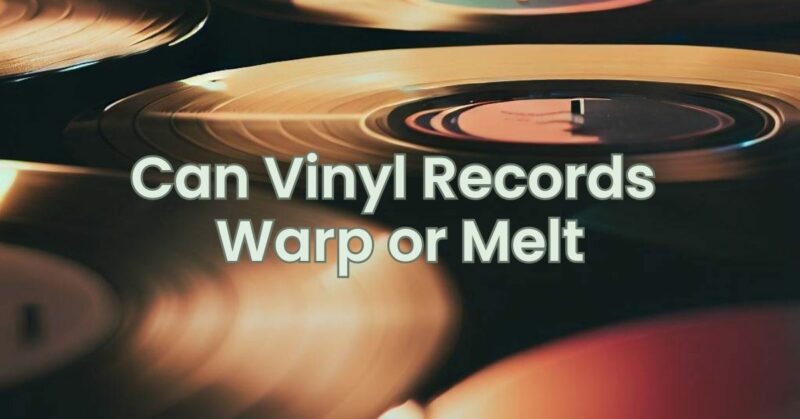Vinyl records have captivated music lovers for decades, offering a unique listening experience and a tangible connection to the music. As cherished collectibles, it’s natural to wonder about their susceptibility to damage, particularly warping and melting. In this article, we will explore the factors that can lead to warping or melting of vinyl records and discuss preventive measures to preserve your cherished vinyl collection.
- Warping of Vinyl Records: Warping is a common issue that can affect vinyl records, rendering them unplayable or causing audio distortion. The primary causes of warping include:
a. Heat Exposure: Exposure to excessive heat is a leading cause of record warping. High temperatures, such as leaving records in a hot car or near radiators, can soften the vinyl, causing it to warp under pressure or weight.
b. Uneven Storage: Storing records improperly, such as stacking them horizontally or placing heavy objects on top of them, can lead to warping over time. Uneven pressure or weight on the records can cause them to bend or deform.
c. Direct Sunlight: Direct sunlight can heat up records quickly and unevenly, leading to warping. UV rays from the sun can also cause discoloration and damage to album covers.
d. Moisture and Humidity: Excessive moisture or high humidity levels can cause vinyl records to absorb moisture, which can result in warping. Mold growth may also occur in humid environments, leading to irreparable damage.
- Melting of Vinyl Records: Unlike warping, vinyl records do not melt under normal conditions. However, they can become distorted or damaged when exposed to extreme heat sources, such as open flames, direct contact with hot surfaces, or prolonged exposure to high temperatures, typically above 160°F (70°C). In these extreme cases, the vinyl can soften and deform, causing irreversible damage to the record.
Preventive Measures to Preserve Vinyl Records
- Proper Storage: Store records upright in a cool, dry place away from direct sunlight. Invest in sturdy record storage solutions that keep records separate and provide adequate airflow to prevent warping.
- Temperature and Humidity Control: Maintain a stable environment with moderate temperatures and humidity levels. Avoid storing records in areas prone to temperature fluctuations, high humidity, or excessive heat.
- Handling with Care: Handle records by their edges to avoid fingerprints and smudges. Never place records on surfaces without protective sleeves to prevent scratches and damage.
- Avoid Heat Sources: Keep records away from direct heat sources like heaters, radiators, or hot vehicles. Prevent exposure to open flames, hot surfaces, or extreme temperatures.
- Vinyl Record Cleaning: Regularly clean your records using appropriate cleaning methods and solutions to remove dust, dirt, and debris. Clean records ensure better playback and reduce the risk of damage.
While vinyl records are generally durable and resilient, they can be susceptible to warping under certain conditions. However, melting is not a typical concern unless exposed to extreme heat sources. By following preventive measures, such as proper storage, temperature and humidity control, gentle handling, and regular cleaning, you can protect your vinyl collection from warping and preserve its longevity. Treat your vinyl records with care, and they will continue to provide countless hours of enjoyment for years to come.

